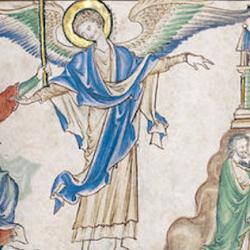Most English translations inform us that there is a book “in the hand of” the One Enthroned in Revelation 5. That is more than the Greek says. In the Greek, the word “hand” does not appear, and the preposition ( epi ) doesn’t mean “in” but rather “on” or “upon.” When John sees the Angel come with a book “in” his hand in chapter 10, he uses the preposition en . Commentators handle the odd preposition by suggesting that the scroll is lying on the Enthroned One’s open hand. There’s a better solution: The book is not in His hand at all. It is simply “on the right” of the Enthroned One. (This is thoroughly argued in various places by Ranko Stefanovic.) The book sits beside Him on a double throne (cf. Revelation 3:21), waiting for someone worthy to come to take the book and occupy the throne.
This is only a slight change, but it opens up various lines of typology that enrich our understanding of the scene. According to Deuteronomy 31:24-26, the priests were to place the “book of the law,” Deuteronomy itself, “beside the ark of the covenant of Yahweh your God, that it may remain there as a witness against you.” That is a type of the book in Revelation 5, which is to the right side of the ark-throne of the Father. But at the beginning of Revelation 5, the book is sitting unused. No one is reading it, no one is worthy. Even unused, it is a witness against the covenant people. But if the book is to do what it was designed to do, it shouldn’t just sit there; it needs to be taken up and read so that what the book requires can be carried out.
The Lamb’s reception of the book thus resembles Josiah’s discovery of the book of the law: Someone discovers and opens a sealed book in the temple, and reads out the curses that are coming because Israel has not kept all that the law demands.










